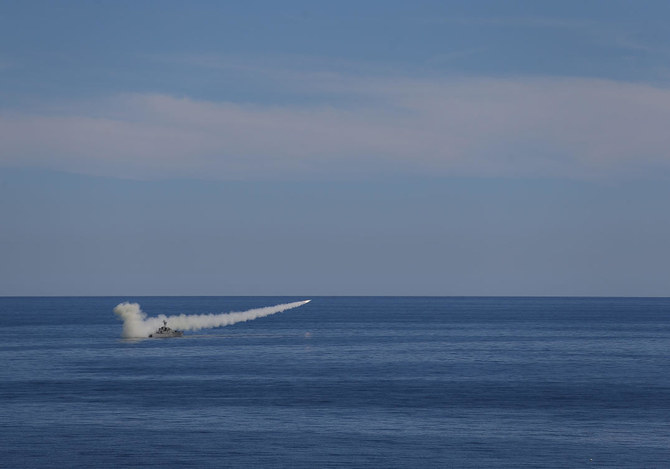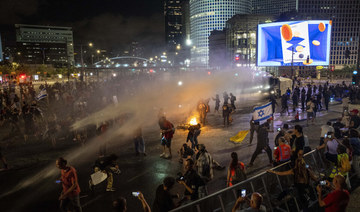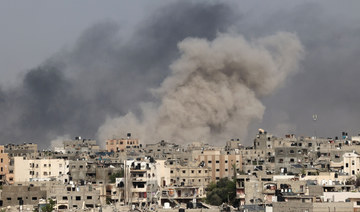TEHRAN, Iran: Iran’s paramilitary Revolutionary Guard forces on Friday held a military exercise involving ballistic missiles and drones in the country’s central desert, state TV reported, amid heightened tensions over Tehran’s nuclear program and a US pressure campaign against the Islamic Republic.
In the first phase of the drill Friday morning, the Guard’s aerospace division launched several surface-to-surface ballistic missiles against simulated enemy bases, state TV reported. It said the drill included Zolfaghar and Dezful solid-fuel ballistic missiles. Bomb-carrying drones were also deployed. The Dezful, a version of the Zolfaghar, has a 700-kilometer (430-mile) range and 450-kilogram (992-pound) warhead.
Iran has missile capability of up to 2,000 kilometers (1,250 miles), far enough to reach archenemy Israel and US military bases in the region. Last January, after the US killed a top Iranian general in Baghdad, Tehran retaliated by firing a barrage of ballistic missiles at two Iraqi bases housing US troops, resulting in brain concussion injuries to dozens of them.
In recent weeks, Iran has increased its military drills. On Wednesday, Iran’s navy held a two-day short-range missile drill in the Gulf of Oman. On Saturday, the Revolutionary Guard held a naval parade in the Arabian Gulf. A week earlier, Iran held a massive drone maneuver across half the country.
Tensions are again rising in the waning days of the administration of President Donald Trump, as Iran ramps up pressure on the West over the US sanctions campaign against the Islamic Republic.
Trump in 2018 unilaterally withdrew the US from Iran’s nuclear deal, in which Tehran had agreed to limit its uranium enrichment in exchange for the lifting of economic sanctions. Trump cited Iran’s ballistic missile program among other issues in withdrawing from the accord.
When the US then increased sanctions, Iran gradually and publicly abandoned the deal’s limits on its nuclear development.
Iran’s Revolutionary Guard holds ballistic missile drill amid tensions
https://arab.news/8g992
Iran’s Revolutionary Guard holds ballistic missile drill amid tensions

- The Guard’s aerospace division launched several surface-to-surface ballistic missiles against simulated enemy bases
- Tensions are again rising in the waning days of the administration of President Donald Trump
Egypt to host talks with Israel, US over Rafah crossing

Al-Qahera News, which has links to Egyptian intelligence, quoted on Saturday a unidentified senior official as saying Cairo was demanding “a total Israeli withdrawal” from the terminal on Gaza’s southern border with Egypt.
“An Egyptian-American-Israeli meeting is scheduled for tomorrow (Sunday) in Cairo to discuss the reopening of the Rafah crossing,” the official said.
The crossing has been closed since Israeli forces seized its Palestinian side in early May, reducing aid flows into the war-torn territory to a trickle.
Since then, Egypt and Israel have blamed each other for the blocking of aid deliveries through Rafah. The Egyptian authorities have refused to coordinate with the Israelis, preferring to work with international or Palestinian bodies.
After talks with US President Joe Biden last month, Egyptian President Abdel Fattah El-Sisi agreed to temporarily divert UN aid to the Kerem Shalom crossing, near Rafah but on Gaza’s border with Israel.
Biden on Friday revealed a multi-phase plan for a ceasefire in the Gaza Strip proposed by Israel, saying it was “time for this war to end.”
The official quoted by Al-Qahera said that Egypt was undertaking “intensive efforts” to “resume negotiations” for a truce “in light of the recent American proposition.”
Hostage families call for a ceasefire deal pushed by Biden, while Israel says conditions must be met
Hostage families call for a ceasefire deal pushed by Biden, while Israel says conditions must be met

- Following Biden’s speech, hostage families said Saturday time was running out with the onus on both Israel and Hamas to accept the deal
- “We want to see people coming back from Gaza alive and soon,” Gili Roman told AP
TEL AVIV: Families of Israeli hostages held by Hamas called for all parties to immediately accept a proposal detailed by US President Joe Biden to end the nearly 8-month-long war and bring their relatives home, but Israel’s government said conditions for a ceasefire still must be met.
Biden outlined a three-phase deal Friday proposed by Israel to Hamas, saying the militant group is “no longer capable” of carrying out another large-scale attack on Israel. He urged the Israelis and Hamas to come to an agreement to release some 100 remaining hostages, along with the bodies of around 30 more, for an extended ceasefire in Gaza.
Ceasefire talks ground to a halt last month after a major push by the US and other mediators to secure a deal in hopes of averting a full Israeli invasion of Gaza’s southern city of Rafah. Israel says the Rafah operation is vital to uprooting Hamas fighters responsible for the Oct. 7 attack on southern Israel that triggered the war.
Israel on Friday confirmed its troops were operating in central parts of the city. The ground assault has led to an exodus of around 1 million Palestinians out of the city and has thrown UN humanitarian operations based in the area into turmoil.
Following Biden’s speech, hostage families said Saturday time was running out with the onus on both Israel and Hamas to accept the deal.
“We want to see people coming back from Gaza alive and soon,” Gili Roman told The Associated Press. His sister, Yarden Roman-Gat, was taken hostage and freed during a weeklong ceasefire in November, but Yarden’s sister-in-law, Carmel, is still being held.
“This might be the last chance to save lives. Therefore, the current state must be changed and we expect all to adhere to Biden’s call for accepting the deal on the table, immediately. There is no other way toward a better situation for all. Our leadership must not disappoint us. But mostly, all eyes should be on Hamas,” he said.
The proposal came after what hostage families said was an aggressive meeting Thursday with Israel’s national security adviser, Tzachi Hanegbi, who told them that the government wasn’t ready to sign a deal to bring all of the hostages home and that there was no plan B.
Hanegbi said this week he expects the war to drag on for another seven months, in order to destroy the military and governing capabilities of Hamas and the smaller Islamic Jihad militant group.
Netanyahu has promised a “total victory” that would remove Hamas from power, dismantle its military structure and return the hostages, and on Saturday, the government said its conditions for ending the war had not changed. Putting a permanent ceasefire in place before the conditions are fulfilled is a “non-starter,” it said.
Many hostage families blame the government’s lack of will to secure a deal for the deaths of many of the hostages in captivity.
“We know that the government of Israel has done an awful lot to delay reaching a deal and that has cost the lives of many people who survived in captivity for weeks and weeks and months and months. Our hearts are broken by the amount of people we will receive that are no longer alive,” Sharone Lifschitz, told AP. Her mother Yocheved was freed in the November ceasefire, and her father Oded is still in captivity.
The first phase of the deal announced by Biden would last for six weeks and include a “full and complete ceasefire,” a withdrawal of Israeli forces from all densely populated areas of Gaza and the release of a number of hostages, including women, the elderly and the wounded, in exchange for the release of hundreds of Palestinian prisoners.
The second phase would include the release of all remaining living hostages, including male soldiers, and Israeli forces would withdraw from Gaza. The third phase calls for the start of a major reconstruction of Gaza, which faces decades of rebuilding from devastation caused by the war.
Biden acknowledged that keeping the Israeli proposal on track would be difficult, saying there were a number of “details to negotiate” to move from the first phase to the second. Biden said that if Hamas fails to fulfil its commitment under the deal, Israel can resume military operations.
Hamas said in a statement Friday it viewed the proposal presented by Biden “positively” and called on the Israelis to declare explicit commitment to an agreement that includes a permanent ceasefire, a complete withdrawal of Israeli troops from Gaza, a prisoner exchange and other conditions.
While the proposal is similar to previous ones, the main difference is the readiness to stop the war for an undefined period, according to analysts. It still leaves Israel the option the renew the war and diminish Hamas’ ability to govern, but over time, said Michael Milshtein, head of the Palestinian Studies Forum in Dayan Center at Tel Aviv University.
Still, experts say Biden’s speech was one of the first times in the war that provided hope that it might end and bring the hostages home.
“It was a very good speech ... it seems that Biden is trying to force it on the Israeli government, he was clearly speaking directly to the Israeli people,” said Gershon Baskin, director for the Middle East at the International Communities Organization. Israelis must take to the streets to demand that the government of Israel accept it, he said.
German Foreign Minister Annalena Baerbock called it an “urgent hope” for lasting peace. She said Saturday it was up to Hamas to show they want to end the conflict.
Meanwhile fighting continued in Gaza.
On Saturday, Israel’s army said it killed a Hamas fighter responsible for directing attacks in Israel and the West Bank and earlier this week, it said its aircraft killed a Hamas fighter in central Gaza who was head of the technology department for its internal security forces.
Also on Saturday, Egypt’s state-run Al-Qahera News said officials from Egypt, the United States and Israel would meet in Cairo over the weekend for talks about the Rafah crossing, which has been closed since Israel took over the Palestinian side of it in early May. The meeting comes a week after Biden discussed the closure of the crossing in a call with Egyptian President Abdel-Fattah El-Sisi.
The crossing is one of the main ways for aid to enter Gaza. Egypt has refused to open its side of the border, fearing the Israeli hold will remain permanent. Egypt has demanded that Palestinians be put back in charge of the facility. The White House has been pressing Egypt to resume the flow of trucks.
Israel launched its war in Gaza after Hamas’ Oct. 7 attack in which militants stormed into southern Israel, killed some 1,200 people — mostly civilians — and abducted about 250. More than 36,170 Palestinians have been killed in Gaza by Israel’s campaign of bombardment and offensives, according to Gaza’s Health Ministry. Its count does not differentiate between civilians and combatants.
’We are hated’: Israelis feel isolation over Gaza war

- Israel seems to have lost the sympathy it initially received after the unprecedented attack
- This loss of support intensified following last week’s Israeli strike on a camp for displaced Palestinians in Rafah
JERUSALEM: A series of diplomatic setbacks, strong condemnation of a recent Gaza strike, and intense protests on Western campuses have left Israelis feeling their country is unfairly isolated.
Israelis expected unwavering support from their allies and the international community after Hamas’s October 7 attack.
But as Israel’s retaliatory offensive against Hamas in Gaza deepened, it seems to have lost the sympathy it initially received after the unprecedented attack.
This loss of support intensified following last week’s Israeli strike on a camp for displaced Palestinians in Rafah, which killed at least 45 people, according to Gazan officials. The military has denied targeting the camp.
The strike drew condemnations from Istanbul to Beijing and from Washington to Paris.
On social media platform Instagram, more than 47 million posts with the hashtag “All eyes on Rafah” have been recorded since the strike.
But Israelis remain defiant despite the growing isolation.
“I don’t think Israel should care what the world has to say... I support our military 100 percent,” Netanel Aronson, a 24-year-old Israeli-American, told AFP.
“I pray for them every day that they should be safe and come home.”
Rising death toll
At least 36,379 Palestinians, mostly civilians, have been killed in Gaza in Israeli bombardments and ground offensive since October 7, according to the health ministry in Hamas-run territory.
Israel’s retaliatory campaign came after the Hamas attack resulted in the deaths of 1,189 people in Israel, mostly civilians, according to an AFP tally based on official Israeli figures.
The militants also took 252 people as hostages, of which 121 are still held in Gaza, including 37 the military says are dead.
“It is a tragedy for everyone,” said Nathalie, who declined to give her last name, referring also to the fate of Palestinians in the Gaza Strip.
“Since everybody is connected, we can see what’s happening. We feel that we are hated,” the 50-year-old said.
“We have the feeling that we are accused of being colonialists and imperialists. But we see ourselves as refugees,” she added, echoing the feeling of many Jews who arrived during the creation of Israel in 1948.
The Palestinians call the creation of Israel as the Nakba — or “catastrophe” — when about 760,000 Palestinians fled or were forced from their homes by the war over Israel’s creation.
Last month, Israel faced a series of diplomatic setbacks.
While the International Court of Justice ordered Israel to stop its ongoing offensive in Rafah, the chief prosecutor of the International Criminal Court sought arrest warrants for Prime Minister Benjamin Netanyahu and Defense Minister Yoav Gallant, along with three senior Hamas leaders.
Ireland, Norway and Spain also recognized a Palestinian state in a coordinated decision on Tuesday, while Slovenia’s parliament is due to vote on such a proposal next week.
Declining global support
Political analyst Dahlia Scheindlin said Israelis were aware the war was damaging their global standing.
“(Israelis) think the world is against Israel. They think that many institutions and countries are anti-Semitic, and that there is a double standard,” Scheindlin said.
She regretted the “devastating” impact of the war on Gazans, but said Israelis see the ongoing military campaign as an “existential struggle” for their people.
Scheindlin said Israelis have been demoralized over the setbacks at international tribunals after Israel was accused of committing some of the worst crimes in Gaza.
Such crimes “Israelis believed were only ever committed against them,” she added.
“So, it’s very hard for them to accept this. They fear the isolation.”
Israelis are also countering the social media campaign “All Eyes on Rafah,” with their own that says “If your eyes are on Rafah, then help us find the hostages.”
In a survey by US-based Pew Research Center before the May 26 strike on a camp of displaced people in Rafah, 40 percent of Israelis thought the country would “definitely” achieve its Gaza war goals.
Only four percent of the Jewish majority thought Israel’s military response in the Palestinian territory had gone “too far.”
But for Christians like Annie Dikbikian, the war has only increased “the hatred” on both sides.
“It’s affecting us... as Christians,” said the Jerusalem-based hairdresser, who hoped “peace, love, and respect” would return soon.
Hezbollah launches series of retaliatory attacks on Israel

- Hezbollah downs Israeli drone over Lebanon with missile
BEIRUT: Lebanese militant group Hezbollah said it launched a series of attacks on Israeli military positions Saturday after state media reported Israel had stepped up its own strikes the night before.
Since the start of the war in the Gaza Strip between Israel and Hamas on October 7, the Iran-backed Hezbollah has exchanged almost daily fire with the Israeli army in support of its Palestinian ally.
On Saturday morning, the Lebanese Islamist group said it had carried out “an air assault using explosive drones against... the Yiftah barracks, targeting the positions of enemy officers and soldiers.”
It said the attack was in retaliation for a drone strike on a motorcycle in Majdal Selm earlier in the day.
The Hezbollah-affiliated Islamic Health Committee said two people were wounded in the drone strike.
The Israeli military said in a statement that “two Hezbollah terrorists operating in the region of Majdal Selm were struck by an aircraft.”
Later on Saturday, the Lebanese Shiite movement said it had “shot down a Hermes 900 drone which was attacking our people and villages.”
Hezbollah, which has increased its use of drones in recent weeks, has also claimed responsibility for several attacks against Israeli military positions “in response to Israeli aggression against southern localities and civilian homes.”
“The enemy (Israel) intensified its attacks last night,” Lebanon’s National News Agency reported.
They included “a series of drone strikes... which resulted in deaths, injuries and extensive damage” in multiple locations near the border, NNA said.
The Israeli military said in a statement on Saturday that its fighter jets had struck “significant Hezbollah assets” in several areas of southern Lebanon, including Adloun, 30 kilometers (19 miles) from the border, in response to launches aimed at northern Israel.
On Friday evening, a woman was killed and multiple people wounded in an Israeli drone strike on the outskirts of Adloun that “completely destroyed” a house, NNA reported.
The nearly eight months of violence have left almost 450 people dead in Lebanon, mostly fighters but including at least 80 civilians, according to an AFP tally.
Among them are 20 rescuers, including 10 members of the Islamic Health Committee.
On the Israeli side, at least 14 soldiers and 11 civilians have been killed in the violence, according to Israeli authorities.
Israel pounds Gaza after Biden outlines ceasefire plan

- Israel’s Benjamin Netanyahu insists on Hamas ‘destruction as part of plan to end Gaza war
- UN chief ‘strongly hopes’ latest development would lead to an agreement for lasting peace
RAFAH, Palestinian Territories: Israeli forces hammered Rafah in southern Gaza with tanks and artillery Saturday, hours after US President Joe Biden said Israel was offering a new roadmap toward a full ceasefire.
Shortly after Biden’s announcement, Israeli Prime Minister Benjamin Netanyahu insisted his country would still pursue the war until it had reached all its aims, including the destruction of Hamas.
Netanyahu on Saturday insisted on Hamas’s destruction as part of an Israeli plan presented by US President Joe Biden to end the Gaza war.
“Israel’s conditions for ending the war have not changed: the destruction of Hamas’s military and governing capabilities, the freeing of all hostages and ensuring that Gaza no longer poses a threat to Israel,” the Israeli leader said in a statement.
“Under the proposal, Israel will continue to insist these conditions are met before a permanent ceasefire is put in place.
“The notion that Israel will agree to a permanent ceasefire before these conditions are fulfilled is a non-starter,” Netanyahu added.
Israel’s opposition leader on Saturday urged Netanyahu to heed US President Joe Biden’s call for a Gaza truce under which Hamas would free hostages, and offered to support the government should far-right coalition partners bolt.
“The government of Israel cannot ignore President Biden’s consequential speech. There is a deal on the table and it should made,” Yair Lapid said in an X post.
“I remind Netanyahu that he has a safety net from us for a hostage-release deal if (Itamar) Ben-Gvir and (Bezalel) Smotrich leave the government.”
The Palestinian militant group, meanwhile, said it “considers positively” the plan laid out by Biden.
In his first major address outlining a possible end to the conflict, the US president said Israel’s three-stage offer would begin with a six-week phase that would see Israeli forces withdraw from all populated areas of Gaza.
It would also see the “release of a number of hostages, including women, the elderly, the wounded, in exchange for (the) release of hundreds of Palestinian prisoners.”
Israel and the Palestinians would then negotiate during those six weeks for a lasting ceasefire — but the truce would continue while the talks remained underway, Biden said.
The US leader urged Hamas to accept the Israeli offer. “It’s time for this war to end, for the day after to begin,” he said, in comments echoed by British Foreign Secretary David Cameron.
Hamas in a statement on Friday evening said it “considers positively” Biden’s speech regarding “a permanent ceasefire, the withdrawal of Israeli forces from Gaza, reconstruction and the exchange of prisoners.”
US Secretary of State Antony Blinken called his counterparts from Jordan, Saudi Arabia and Turkiye on Friday to press the deal.
UN chief Antonio Guterres “strongly hopes” the latest development “will lead to an agreement by the parties for lasting peace,” his spokesman Stephane Dujarric said.
German Foreign Minister Annalena Baerbock said the Israeli offer “provides a glimpse of hope and a possible path out of the war’s deadlock,” while EU chief Ursula von der Leyen welcomed a “balanced and realistic” approach to end the bloodshed.
But Netanyahu took issue with Biden’s presentation of what was on the table, insisting the transition from one stage to the next in the proposed roadmap was “conditional” and crafted to allow Israel to maintain its war aims.
“The prime minister authorized the negotiating team to present an outline for achieving (the return of hostages), while insisting that the war will not end until all of its goals are achieved,” Netanyahu’s office said.
Those aims included “the return of all our hostages and the elimination of Hamas’s military and governmental capabilities,” it added.
“The exact outline proposed by Israel, including the conditional transition from stage to stage, allows Israel to maintain these principles.”
Israel has repeatedly vowed to destroy Hamas since the Palestinian militant group attacked southern Israel on October 7.
Israel sent tanks and troops into Rafah in early May, ignoring concerns over the safety of displaced Palestinian civilians sheltering in the city on the Egyptian border.
Before the Rafah offensive began, the United Nations said up to 1.4 million people were sheltering in the city.
Since then, one million have fled the area, the UN agency for Palestinian refugees, UNRWA, has said.
The Israeli seizure of the Rafah crossing has further slowed sporadic deliveries of aid for Gaza’s 2.4 million people and effectively shuttered the territory’s main exit point.
Israel said last week that aid deliveries had been stepped up.
But Blinken acknowledged on Friday that the humanitarian situation was “dire” despite US efforts to bring in more assistance.
The World Food Programme said daily life had become “apocalyptic” in parts of southern Gaza since Israel began its assault on Rafah in early May.
The Gaza war was sparked by Hamas’s unprecedented October 7 attack on southern Israel, which resulted in the deaths of 1,189 people, mostly civilians, according to an AFP tally based on Israeli official figures.
Militants also took 252 hostages, 121 of whom remain in Gaza, including 37 the army says are dead.
Israel’s retaliatory offensive has killed at least 36,284 people in Gaza, mostly civilians, according to the Hamas-run territory’s health ministry.
In northern Gaza, witnesses said that after carrying out a three-week operation in the town of Jabalia and its neighboring refugee camp, troops had ordered residents of nearby Beit Hanun to evacuate ahead of an imminent assault.
The Israeli army said troops “completed their mission in eastern Jabalia and began preparation for continued operations in the Gaza Strip.”
– with Reuters




















